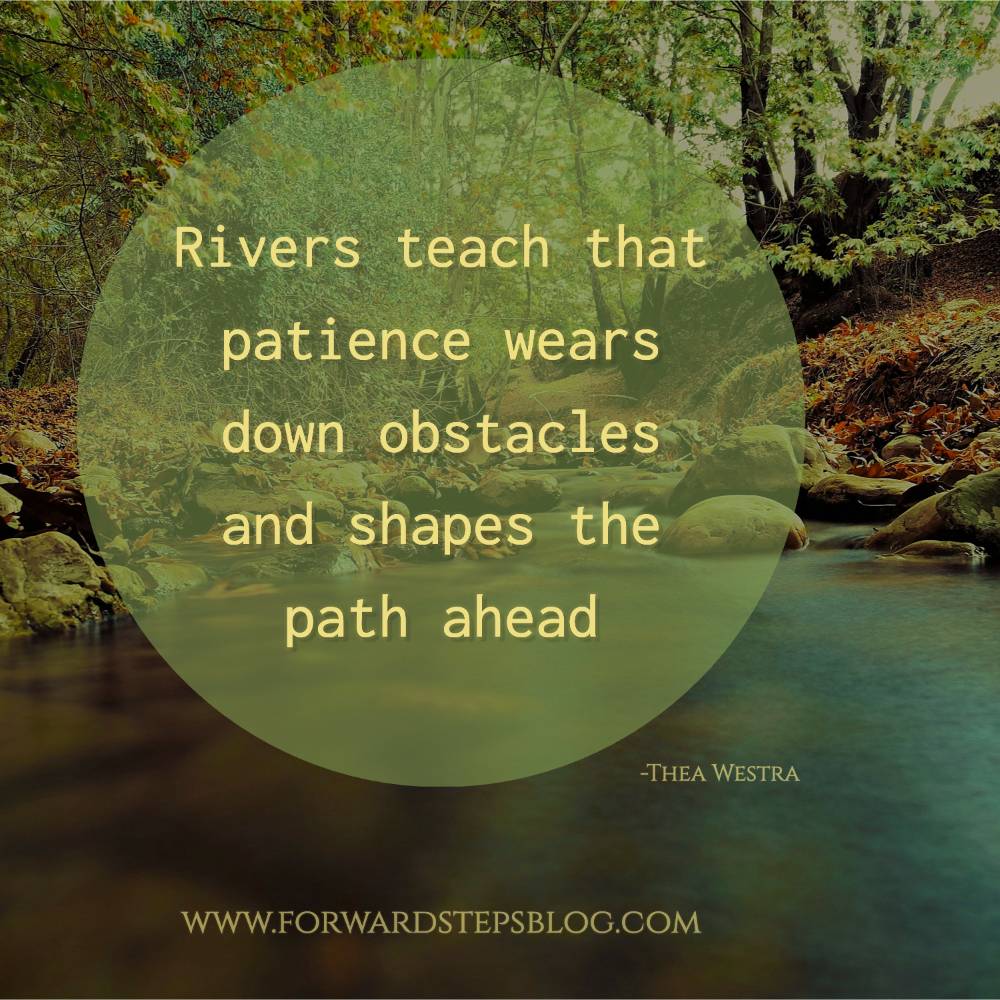The rhythm of life in nature
Nature does not hurry. Trees grow steadily, rivers carve valleys over centuries and seasons arrive without apology. Humans often chase schedules, deadlines and fleeting goals, yet nature moves with an unshakable rhythm. Observing the natural world teaches patience, showing us that life unfolds in its own time. The oak tree does not fret about the next storm, nor does the river rush to meet the ocean. It simply flows, persistently, with purpose.
 Spending a few minutes each day watching a river, listening to the wind or noticing the subtle sway of grass can reveal a profound lesson: progress is not always visible, yet it is constant. Writing in a journal what you notice about these rhythms encourages reflection on your own pace of growth. Often, personal development is invisible at first; the seeds of change germinate quietly and only later do we recognise the transformation that has taken place.
Spending a few minutes each day watching a river, listening to the wind or noticing the subtle sway of grass can reveal a profound lesson: progress is not always visible, yet it is constant. Writing in a journal what you notice about these rhythms encourages reflection on your own pace of growth. Often, personal development is invisible at first; the seeds of change germinate quietly and only later do we recognise the transformation that has taken place.
Beyond patience, the rhythms of nature invite us to align our lives with cycles of energy and rest. Humans tend to force productivity during low-energy periods, yet noticing when our own mental and emotional tides ebb and flow can profoundly improve wellbeing. Taking a walk at sunrise or pausing to watch a sunset reminds us that life has natural cycles and resisting them often leads to stress rather than progress.
Adaptability is survival
A coastline reshapes after storms, birds migrate when seasons shift and trees bend in strong winds without snapping. Life in nature is constant negotiation with circumstances beyond control. Observing these adaptations teaches us that resilience is not stubbornness; it is flexibility.
Even the smallest creatures display resilience we can emulate. Share on XAdapting does not mean surrendering goals, it’s about finding new paths to achieve them. For instance, if a career plan falters, exploring an adjacent skill or pivoting to a different opportunity reflects nature’s adaptive intelligence. Journaling past experiences of change, noting moments when you adapted successfully, can remind you of your own capacity to bend without breaking.

Cycles and renewal
Everything in nature follows cycles. Leaves fall only to return as blossoms, rivers flood then recede and night inevitably yields to day. Observing these patterns reminds us that challenges are temporary and renewal inevitable.
Notice how a forest regenerates after a fire. While destruction seems complete, new growth emerges rapidly, richer and more diverse than before. Humans can mirror this pattern in emotional recovery. Experiencing loss or setback may feel like an end, yet it can also serve as fertile ground for creativity, self-awareness and deeper connection. Reflect on personal cycles in your journal—periods of challenge, growth, rest and achievement—and consider how embracing these cycles reduces unnecessary resistance and anxiety.
Rivers carve stone over centuries, reminding us that small actions create lasting change. Share on XBy intentionally marking these cycles in our lives, we can synchronise work, rest and creativity with natural rhythms. For example, taking seasonal breaks to reflect and recalibrate mirrors the way nature replenishes itself. Long-term planning then becomes less about rigid timelines and more about understanding when energies peak and when patience is required.
Interconnectedness and community
No tree grows alone, no river flows without its tributaries and no animal thrives in isolation. Ecosystems exist through complex cooperation, mutual support and shared resources. Observing these systems teaches the value of relationships, contribution and humility.

Beyond human interaction, interconnectedness teaches us that our actions ripple outward. Small choices in daily life, like conserving water or reducing waste, influence a broader ecosystem. Recognising this responsibility instils mindfulness, reminding us that we are not separate from the world we inhabit. The health of our communities and natural environments reflects the quality of our attention and care.
Presence in small details
Nature is composed of infinite details: a dew drop on a leaf, the subtle curve of a riverbank, the rustle of insects among grass. Paying attention to these minutiae sharpens mindfulness. By slowing down and observing the small, seemingly insignificant elements of life, we cultivate appreciation for the present moment.
Trees bend without breaking, reminding us that flexibility is a form of strength. Share on XA simple exercise: focus on a single flower or tree for several minutes, noticing colour, texture, shape and movement. Journal what surprises you or what you had overlooked. These moments train the mind to be fully engaged, reducing mental chatter and fostering creativity. Over time, presence becomes a habit and mundane moments carry richness previously unnoticed.
The act of noticing also nurtures gratitude. Observing a sunrise or listening to birdsong creates a subtle shift in perception: life is more than achievements, more than tasks and more than deadlines. Presence allows us to fully inhabit experiences, drawing joy from details that often go unseen.
Resilience through simplicity
Deserts survive on minimal resources, seeds lie dormant for years and plants thrive in barren soil. Life does not always require abundance, it requires adaptation, focus and clarity of purpose. Simplifying our environments and routines can strengthen resilience, providing space for what truly matters.

Simplicity also extends to emotional life. By removing unnecessary resentment or comparisons, we create mental and emotional space for calm, intentional action. Observing natural systems shows that thriving does not depend on extravagance however on efficiency, adaptability and harmony with available resources.
The power of impermanence
Mountains erode, rivers shift and seasons change. Nothing is permanent. Observing impermanence in nature teaches acceptance and courage. Clinging to what cannot last leads to suffering; flowing with change brings freedom and clarity.
Seeds waiting in the soil teach the power of timing and preparation. Share on XDaily reflection on impermanence—whether through journaling, mindful walking or meditation—helps recognise that every moment is fleeting and every opportunity precious. Gratitude for impermanence strengthens presence. Challenges become temporary, achievements are celebrated without arrogance and relationships are valued deeply.

Observation as a mirror
Finally, nature acts as a mirror, reflecting our own strengths and shortcomings. Noticing a tree bending in a storm may reveal our own rigidity. Observing the perseverance of animals teaches endurance. Seeing a river patiently carve rock over decades reminds us that persistence often outlasts force.
Journaling about these reflections allows for integration. Write about a pattern in nature and relate it to your personal life: Where do you resist change? Where could patience serve you better? Where could simplicity, presence or gratitude transform a challenge? The natural world provides countless templates for living, each waiting to be noticed, reflected upon and applied.
Observing a falling leaf remind us that letting go is part of growth and renewal. Share on XNature is more than scenery. It is a teacher, philosopher and companion. By observing its patience, adaptability, cycles, interconnectedness, attention to detail, simplicity, impermanence and reflective power, we learn to live with resilience, presence and meaning. It encourages us to slow down, think deeply and act intentionally. Life, when viewed through the lens of nature, reveals patterns, lessons and wisdom that can guide us toward a richer, more grounded existence.
PLUS check out these free gifts from friends… CHECK out the following great resources as well…Forward Steps Personal Development »







